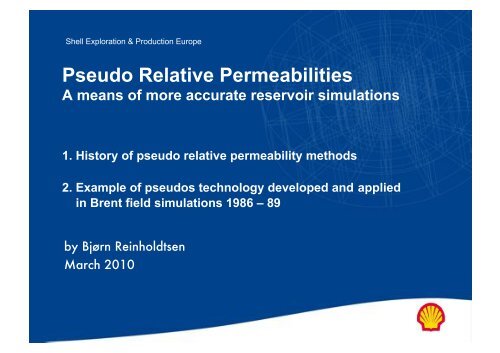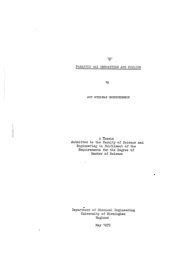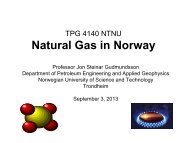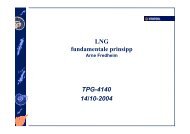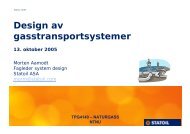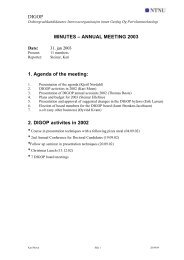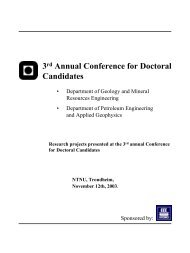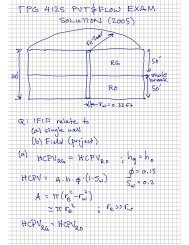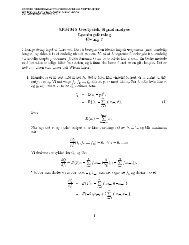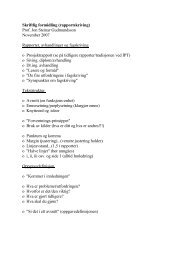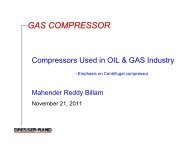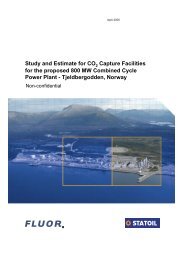Pseudo Relative Permeabilities
Pseudo Relative Permeabilities
Pseudo Relative Permeabilities
You also want an ePaper? Increase the reach of your titles
YUMPU automatically turns print PDFs into web optimized ePapers that Google loves.
Shell Exploration & Production Europe<br />
<strong>Pseudo</strong> <strong>Relative</strong> <strong>Permeabilities</strong><br />
A means of more accurate reservoir simulations<br />
1. History of pseudo relative permeability methods<br />
2. Example of pseudos technology developed and applied<br />
in Brent field simulations 1986 – 89<br />
by Bjørn Reinholdtsen!<br />
March 2010!
My Resume<br />
2006 – Present !Regional Value Assurance Advisor – Shell EP Europe<br />
Reviews of Shell’s projects in Europe<br />
2003 – 2006 !Regional Resource Volume Manager – Shell EP Europe<br />
Management of Shell’s reserves in Europe during reserves dispute with SEC<br />
2001 – 2003 !Capability Manager, Norske Shell<br />
Strengthening technical skills of PE staff<br />
1999 – 2001 !Managing Shell’s interests in a group of fields and looking after staff skills<br />
1998 – 1999 !Responsible for all Shell’s PE work and PE staff (25) in Norway<br />
1991 – 1998 Responsible for all Shell’s RE work in Norway, including Troll and Draugen<br />
developments"<br />
1989 – 1991 Managing Shell’s interests in all partner operated oil fields in Norway"<br />
1986 - 1989 !Major simulation study (20 man years) leading to Brent field depressurisation"<br />
1980 – 1986 !Reservoir engineer for Troll gas development/leading multi company task force"<br />
1976 – 1980 !Development of Statfjord field (Mobil)!<br />
1971 –1975 !Student NTH!<br />
2!<br />
<strong>Pseudo</strong>s presentation!<br />
March 2010!
<strong>Pseudo</strong> relative permeabilities "<br />
A means of incorporating more accurate physics into each grid block"<br />
- Effects of detailed geology and saturation distribution represented in "<br />
(pseudo) relative permeabilities for large grid blocks!<br />
Advantages!<br />
• Allows accurate simulation with fewer grid blocks!<br />
• Suppresses numerical dispersion "<br />
!(non-physical flow of displacing fluid into neighbouring grid blocks)!<br />
• Reduced turn-around times for simulation runs!<br />
Disadvantages!<br />
• Not well understood by simulation engineers!<br />
• Generation of pseudos is seen as cumbersome!<br />
• Belief that more grid blocks are a simpler option!<br />
• <strong>Pseudo</strong>s cannot fully solve all grid resolution issues "<br />
!(e.g. local balance between gravity and viscous forces in well coning/cusping situations)!<br />
3!<br />
<strong>Pseudo</strong>s presentation!<br />
March 2010!
<strong>Relative</strong> Permeability as measured in laboratory<br />
Basic input to all reservoir simulation work!<br />
• Measured on small core plugs"<br />
• Often applied in field scale<br />
reservoir simulation!<br />
– Assumed valid for entire grid<br />
block volume!<br />
– Does not account for<br />
saturation gradients within the<br />
grid block!<br />
– Leads to non-physical numeric<br />
dispersion and inaccurate<br />
simulation results"<br />
• <strong>Pseudo</strong> relative permeabilities<br />
represent a method for more<br />
accurate field scale simulation!<br />
4!<br />
<strong>Pseudo</strong>s presentation!<br />
March 2010!
Brief history of pseudo rel. perm. technology<br />
• Early concepts (late 1960’s – 1970’s) focussed on representing 3D problems<br />
in 2D areal simulators (Coates et. al., Hearn, Jacks et. al., Kyte & Berry)!<br />
– Available computers allowed very limited number of grid blocks!<br />
• During the 1980’s a number of papers aimed at refining the generation of<br />
psuedos!<br />
– Many papers focus on upscaling of models of heterogeneous reservoirs"<br />
(Killough et. al., Davies & Haldorsen, Kossack et. al.)!<br />
• In 1991 Stone presented a rigorous method which allows reproduction of fine<br />
grid model results for varying rates and including non-communicating layers!<br />
• In later years the interest in pseudo relative permeabilities has faded!<br />
– Apparently the belief is that more powerful computers, allowing many<br />
more grid blocks, has removed the need for pseudos!<br />
– Another factor is that preparation of pseudos is seen as combersome and<br />
is not well understood by simulation engineers!<br />
5!<br />
<strong>Pseudo</strong>s presentation!<br />
March 2010!
SPE Advanced Technology Workshop on History<br />
Matching in Nov. 2009 concluded:<br />
6!<br />
<strong>Pseudo</strong>s presentation!<br />
March 2010!
Kyte & Berry procedure for calculating pseudos<br />
SPE5105!<br />
<strong>Pseudo</strong>s based on phase flow and phase<br />
pressure differences between upscaled<br />
grid blocks – adjusted for gravity head<br />
between grid block centres!<br />
7!<br />
<strong>Pseudo</strong>s presentation!<br />
March 2010!
Brent Field - Structural Cross-section<br />
Brent Group type log<br />
and layering<br />
• Model layering is based on the<br />
presence of extensive shales covering<br />
most of field area!<br />
• Holes in these shales are mapped based<br />
on well observations!<br />
8!<br />
<strong>Pseudo</strong>s presentation!<br />
March 2010!
Areal simulation grid<br />
Brent reservoir<br />
• Grid block size 1000ft x 500ft<br />
• Basis for grid block size:<br />
– Overnight turnaround of<br />
history match runs<br />
• About 100 wells during<br />
field history<br />
9!<br />
<strong>Pseudo</strong>s presentation!<br />
March 2010!
Water saturation distribution in area<br />
corresponding to one Brent model grid block<br />
• Displacement front velocity ~1ft/day<br />
• 1! years travel time through<br />
a 500 ft FFM grid block<br />
• Assuming fluid dispersion within FFM grid<br />
block volume will lead to serious error<br />
Water"<br />
saturation!<br />
72 %!<br />
94 ft!<br />
46 %!<br />
20 %!<br />
10!<br />
<strong>Pseudo</strong>s presentation!<br />
500 ft!<br />
March 2010!
Brent study<br />
2-D and 1-D simulation models for generation<br />
and checking of pseudo curves<br />
• CROSSPERM (Kyte & Berry, now retired) used<br />
to calculate pseudo rel. perm. in main flow<br />
direction (updip)<br />
11!<br />
<strong>Pseudo</strong>s presentation!<br />
March 2010!
Brent reservoir intra-layer permeability profiles<br />
Several profiles gave the<br />
“same” pseudo rel. perm!<br />
12!<br />
<strong>Pseudo</strong>s presentation!<br />
March 2010!
<strong>Pseudo</strong> relative permeability for<br />
coarsening upwards sequence<br />
Updip flow direction!<br />
Sw ~50% at water<br />
breakthrough to next<br />
updip grid block<br />
13!<br />
<strong>Pseudo</strong>s presentation!<br />
March 2010!
Comparison of 2-D and 1-D model saturation profiles<br />
Low permeability coarsening upwards profile<br />
14!<br />
<strong>Pseudo</strong>s presentation!<br />
March 2010!
Comparison of 2-D and 1-D model pressure profiles<br />
Low permeability coarsening upwards profile<br />
15!<br />
<strong>Pseudo</strong>s presentation!<br />
March 2010!
Comparison of 2-D model saturation profiles<br />
for uniform and coarsening upwards<br />
permeability profiles<br />
16!<br />
<strong>Pseudo</strong>s presentation!<br />
March 2010!
<strong>Pseudo</strong> rel. perm. type<br />
allocation<br />
Brent reservoir layer 1<br />
5<br />
3<br />
3<br />
4<br />
6<br />
6<br />
2<br />
9<br />
2<br />
5<br />
6<br />
4<br />
5<br />
3<br />
17!<br />
<strong>Pseudo</strong>s presentation!<br />
March 2010!
Water saturation profiles in<br />
2-D and 1-D simulations – both with rock curves<br />
18!<br />
<strong>Pseudo</strong>s presentation!<br />
March 2010!
Water saturation profiles<br />
in 2-D with rock curves and<br />
1-D simulations with pseudo curves<br />
19!<br />
<strong>Pseudo</strong>s presentation!<br />
March 2010!
<strong>Pseudo</strong>s in other directions<br />
Brent study<br />
• CROSSPERM (Kyte & Berry, now retired) used<br />
to calculate pseudo rel. perm. in main flow<br />
direction (updip)<br />
• <strong>Pseudo</strong>s in other directions<br />
were based on saturations at<br />
grid block boundaries<br />
• Many partially oil saturated<br />
blocks around OWC<br />
• Initialisation with VE drainage pseudos combined<br />
with hysteresis give “correct” rel. perms and<br />
reduced Sor around OWC<br />
20!<br />
<strong>Pseudo</strong>s presentation!<br />
March 2010!
Simplified vertical equilibrium model for drainage<br />
1) for initialising model and<br />
2) for starting points of hysteresis scanning curves<br />
• <strong>Pseudo</strong>s in all directions are calculated<br />
based on saturations at grid block<br />
boundaries<br />
• Home-made FORTRAN program used in<br />
Brent study<br />
Sharp contacts assumed in the<br />
middle of transition zone in all sublayers<br />
(simplified cap. pressures)!<br />
Similar to Coats model for dipping reservoir<br />
21!<br />
<strong>Pseudo</strong>s presentation!<br />
March 2010!
Total set of oil/water pseudos<br />
Brent permeability profile prototype 1<br />
Solid lines- imbibition<br />
Dashed lines – drainage<br />
+ signs shows positive direction<br />
22!<br />
<strong>Pseudo</strong>s presentation!<br />
March 2010!
Hysteresis on pseudo relative permeabilities<br />
New hysteresis model developed for Brent implemented in Shell’s BOSIM simulator<br />
Updip direction(East)<br />
Drainage!<br />
Perpendicular to displacement<br />
(North and South directions)<br />
Hysteresis<br />
scanning curves!<br />
Imbibition!<br />
23!<br />
Observations<br />
• Hysteresis options in most simulators are in principle based on dispersed flow!<br />
• However, in some cases functions are flexible and may allow valid hysteresis"<br />
representation also for pseudo rel. perms!<br />
<strong>Pseudo</strong>s presentation!<br />
March 2010!
Reverse (down) cusping of oil in areal layer 2<br />
of detailed 3-D model<br />
Mid block well<br />
location<br />
Downdip well<br />
location<br />
24!<br />
<strong>Pseudo</strong>s presentation!<br />
March 2010!
Calculation method for oil/water well pseudos<br />
• The following information was extracted from the simulator at selected time steps:!<br />
– q o !- Oil rate for the producing half well!<br />
– q w !- Water rate for the producing half well!<br />
– BHFP !- Bottom hold flowing pressure at the mid point of top completed grid block<br />
(datum level)!<br />
– p w !- Pore volume weighted datum water phase pressure within the 20 grid block<br />
areal window!<br />
– p o !- Pore volume weighted datum oil phase pressure within the 20 grid block areal<br />
window!<br />
– S w !- Pore volume weighted water saturation within the 20 grid block areal window!<br />
• For convenience a constant is calculated during the period of single phase flow before water<br />
reaches the well area (drawdown per unit oil rate for k ro =1)!<br />
• Well pseudo oil and water relative permeabilities at later times are calculated as follows: !<br />
25!<br />
<strong>Pseudo</strong>s presentation!<br />
March 2010!
Cusping of gas in areal layer 2<br />
of detailed 3-D model<br />
26!<br />
<strong>Pseudo</strong>s presentation!<br />
March 2010!
Calculation method for gas/oil well pseudos<br />
• The following information was extracted from the simulator at selected time steps:!<br />
– q o !- Oil rate for the producing half well!<br />
– q g !- Water rate for the producing half well!<br />
– BHFP !- Bottom hold flowing pressure at the mid point of top completed grid block<br />
(datum level)!<br />
– p g !- Pore volume weighted datum gas phase pressure within the 20 grid block areal<br />
window!<br />
– p o !- Pore volume weighted datum oil phase pressure within the 20 grid block areal<br />
window!<br />
– S l !- Pore volume weighted liquid saturation within the 20 grid block areal window!<br />
• For convenience a constant is calculated (drawdown per unit oil rate for k ro =1)!<br />
• Well pseudo oil and water relative permeabilities are calculated as follows: !<br />
27!<br />
<strong>Pseudo</strong>s presentation!<br />
March 2010!
Well pseudos – Brent prototype 1<br />
Solid lines - midblock well location<br />
Dashed lines – updip well location<br />
Dotted lines – downdip well location<br />
• Facility for generating well pseudos is not readily available in MoReS<br />
• However, same approach as used in Brent study can be adopted<br />
28!<br />
<strong>Pseudo</strong>s presentation!<br />
March 2010!
Saturation distribution in oil rim models subsequent<br />
to water and gas breakthrough<br />
3-D fine grid model with rock rel.<br />
perms - layer 2<br />
2-D coarse grid model with inter grid block<br />
pseudos and well pseudos<br />
29!<br />
<strong>Pseudo</strong>s presentation!<br />
March 2010!
Performance comparison<br />
Fine and coarse grid oil rim models<br />
3-D fine grid model with rock rel.<br />
perms!<br />
2-D coarse grid model with inter grid block<br />
pseudos and well pseudos!<br />
GOR!<br />
GOR!<br />
Observations!<br />
• Production performances of the two models are similar!<br />
30!<br />
<strong>Pseudo</strong>s presentation!<br />
Delayed gas<br />
breakthrough!<br />
• However, gas breakthrough is delayed by about 2 years in the coarse grid model "<br />
(GOR development thereafter is accurate)!<br />
• Demonstrates limitation of pseudos "<br />
- Focussed pressure sink around well not properly represented in coarse grid!<br />
March 2010!
Conclusions<br />
• <strong>Pseudo</strong> relative permeabilities can substantially reduce the number of grid<br />
blocks !<br />
– Accurate simulation can be achieved with number of grid blocks<br />
reduced by a factor of 10 or more!<br />
– The Brent study demonstrates the potential of this technology!<br />
• <strong>Pseudo</strong>s can be introduced in any commercial simulator, but may require<br />
separate software and manipulation of data from fine grid simulations!<br />
• Simulation of large fields with many wells are the most obvious candidates<br />
for the use of pseudo relative permeabilities!<br />
31!<br />
<strong>Pseudo</strong>s presentation!<br />
March 2010!
END<br />
32!<br />
<strong>Pseudo</strong>s presentation!<br />
March 2010!
Brent reservoir model<br />
History match of Cycle 1 wells<br />
33!<br />
<strong>Pseudo</strong>s presentation!<br />
March 2010!
Brent reservoir model<br />
History match of RFT pressures<br />
34!<br />
<strong>Pseudo</strong>s presentation!<br />
March 2010!


